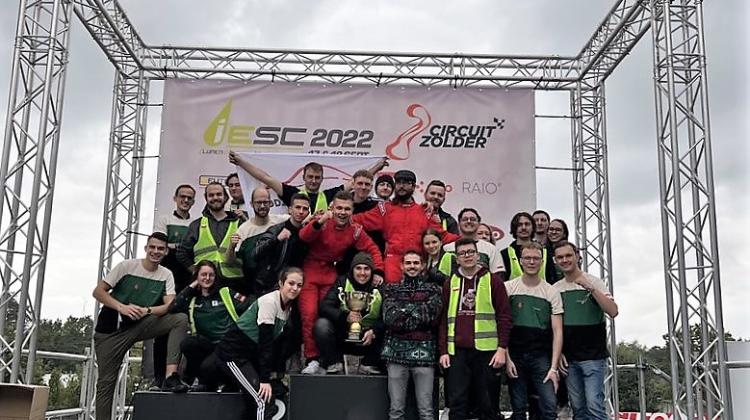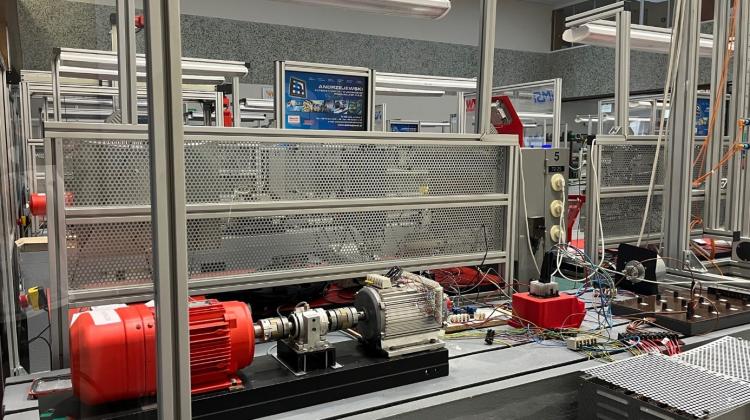Lodz start-up is working on the textile band to monitor hydration of the body

Textile band with printed electronic circuit, which is being developed by Lodz start-up founded by specialists from Lodz University of Technology, is intended to monitor hydration of active sportsmen, small children and seniors, whose thirst fades with age.
myHydro will be an innovative solution, a combination of textiles, electronics and medicine. Prototype band will soon be tested on a group of patients, and the finished product is expected to appear on the market in about three years.
Author of the solution, Dr. Magdalena Owczarek - Assistant Professor at the Institute of Textile Architecture, Lodz University of Technology - told PAP that the band is design to solve the problem of hydration monitoring and signal whether the level of hydration is healthy or not.
"In most cases, the body sends a signal of thirst, but in many cases, unfortunately, it fails us. This often happens in the case of older people who tend to forget about drinking and their thirst fades with age, hard-working people, and especially young people who have succumbed to the trend of sports activities, running, without thinking about the consequences for health and how the body should be hydrated and fed" - she explained.
Dehydration can manifest itself, among others, with headaches, general fatigue and lack of efficiency. "Consequently, it can lead to muscle weakness and hindered function of various internal organs including heart, kidneys or circulatory system" - she added.
The solution developed by specialists from Lodz to monitor hydration is intended to be very simple - it will be a textile band with printed electronics. The idea came from wristbands used by athletes to wipe the sweat from their forehead. "To this wristband we want to add electronics that will monitor our level of hydration and signal a good or bad level. We want the information to be clear and readable for all groups of users" - noted Dr. Owczarek.
In the basic version, the hydration level will be indicated by LEDs - blue showing normal levels and pulsating red indicating dehydration.
Authors of the solution plan to personalize bands, because every body is different and the optimal level of hydration will be different in each case. They also plan to create a version of the band with a display, which would show more information about hydration of the body. The authors do not want to reveal the details of their solution, but assure that their band is non-invasive.
"We do not interfere with the skin or the body in any way, the measurement is non-invasive" - emphasised Dr. Owczarek.
Currently the team is working on the development of the "transition" version of the prototype band - for now it is a fairly large capsule, which houses the electronics, combined with a textile band. Ultimately, the whole system will be miniaturized to the form of textile band with printed electronics. "Our prototype will enter the research stage on a concrete, statistical group of patients" - she added. Research will be held in the DynamoLab of the Medical University of Lodz.
In June last year, the authors of the idea won the competition organized in the framework of an international consortium - European Institute of Innovation & Technology EIT Health, dedicated to healthy ageing research, the Polish partner of which is the Medical University of Lodz. The grant allowed to set up a tech company\'s and develop another prototype. They also had the opportunity to present their idea to investors during a competition in Barcelona, Spain.
Co-founder of the start-up and doctoral student at the Lodz University of Technology Ewelina Pabjańczyk-Wlazło told PAP that the work on the band will take about two-three years.
"Over the next two to three years we will improve the prototype and create an application that manage the entire measuring system and that can be installed on user\'s smartphone or computer. Another step is personalization, creating all the algorithms associated with carrying out this study, averaging the data. And, if we succeed, also the start of production" - said Pabjańczyk-Wlazło.
PAP - Science and Scholarship in Poland
szu/
tr. RL
Przed dodaniem komentarza prosimy o zapoznanie z Regulaminem forum serwisu Nauka w Polsce.


















